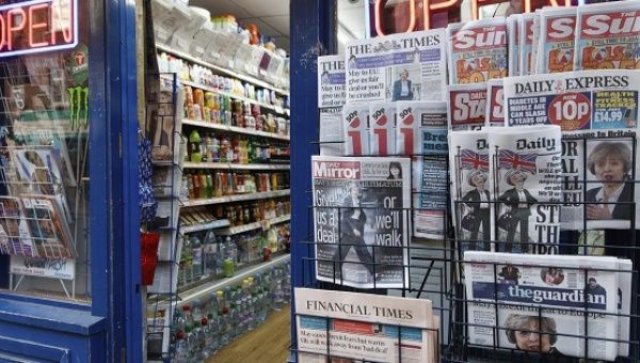
Media coverage encouraged and inflamed Britain’s referendum campaign on whether to leave the European Union last year to make it the “most divisive, hostile, negative and fear-provoking” in British history, according to a new report.
King’s College London’s Centre for the Study of Media, Communication and Power (CMCP) analysed more than 15,000 articles published online by 20 national news outlets. It found the media coverage “acrimonious and divisive” and dominated by “overwhelmingly negative” reports about the consequences of migration to Britain.
“Migrants were blamed for many of Britain’s economic and social problems,” the report said, most notably for putting unsustainable pressure on public services.
This is the first study to examine all articles published about last year's referendum by leading British national news outlets online. It included all national newspapers, magazines such as The Economist, broadcasters like BBC, ITV, Channel 4 and Sky News, and digital media such as Buzzfeed and Huffington Post.
The report said the media’s coverage of immigration more than tripled over the 10-week course of the campaign, faster than any other political issues. Immigration dominated print newspapers with 99 related front pages, compared with 82 about the economy. Most of them were published by pro-Leave newspapers, like the Daily Express and the Daily Mail.
Leaders of the Leave campaign also put immigration as their central issue by the start of the campaign. Politicians like Iain Duncan Smith, Michael Gove, Boris Johnson and Nigel Farage all frequently made negative claims about immigration.
On the opposite side, Remain leaders focused more on the negative economic effects of Brexit instead of the issue of immigration. In general, the economy was the most referenced issue, as 7028 articles related to the referendum referenced the economy. Immigration came second with 4383 articles.
However, Leave leaders successfully undermined those warnings by labelling them as deliberate “scaremongering” from the Remain campaign and questioning its leaders’ honesty, expertise and motivation.
Other political issues, such as environment, foreign policy, defence and education, were dwarfed by coverage of the economy and immigration.
The report concludes: “Given the extent to which each side accused the other of dishonesty and scaremongering, and the extent to which these claims were picked up and often amplified in news outlets, it would be surprising if the public’s political trust had not diminished, and their fears had not increased, after the vote of 23 June 2016.”
CMCP’s director Martin Moore told The Guardian there were lessons for the current election campaign from the bitter referendum coverage.
“The incumbent cannot control the agenda,” he said.
[Abridged from TeleSUR English.]
Like the article? Subscribe to Green Left now! You can also like us on Facebook and follow us on Twitter.